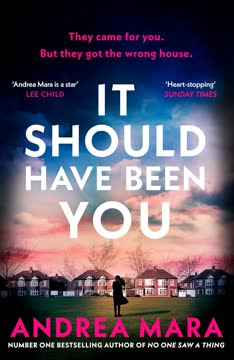Plot Summary
Screenshot Sparks Suburban Chaos
Susan O'Donnell, a sleep-deprived new mother and teacher, accidentally sends a snarky WhatsApp message about her neighbor Celeste to the entire Oakpark group, not just her sisters. The message, which includes gossip about Celeste's family, spreads like wildfire, exposing Susan's identity and profession. The fallout is immediate: Susan is shamed, threatened, and ostracized by her community. Her mistake, born of exhaustion and frustration, sets off a chain reaction that will upend not only her life but the lives of everyone around her. The emotional weight of guilt, fear, and public humiliation presses down on Susan, as she realizes her private venting has become a very public disaster.
The Fallout Spreads Online
As Susan's message circulates, the Oakpark WhatsApp group and local Facebook pages explode with speculation, outrage, and moralizing. Her phone is bombarded with messages, some anonymous and threatening. The community's appetite for drama is insatiable, and Susan's professional reputation as a teacher is now at risk. She tries to apologize to Celeste, but is met with silence and further condemnation. The digital mob's judgment is swift and merciless, leaving Susan isolated and anxious. The incident exposes the dark side of online communities, where empathy is scarce and schadenfreude reigns. Susan's sense of safety in her own neighborhood begins to erode, and the emotional toll deepens.
A Brick Through the Night
The tension turns physical when a brick is thrown through Susan's bedroom window in the middle of the night, narrowly missing her and her baby, Bella. The attack shatters any illusion of security and heightens Susan's paranoia. The police are called, but can offer little comfort. The incident is likely retaliation for her message, but the perpetrator remains unknown. Susan's marriage, already strained by new parenthood, is further tested as she and her husband Jon struggle to cope with the fear and uncertainty. The sense of being watched and targeted intensifies, and Susan's mental state begins to fray under the relentless pressure.
Doxed and Threatened
Susan's private details—her phone number and address—are posted online, and she receives a chilling anonymous text: "You deserve to die for that message." The threat is both terrifying and surreal, pushing Susan to the edge. She becomes hypervigilant, questioning every noise and shadow. The doxing not only endangers her but also her family, as the boundaries between online and real-world harassment blur. The police are notified, but the sense of vulnerability persists. The episode exposes the dangers of digital exposure and the ease with which a community can turn on one of its own. Susan's world contracts, and trust evaporates.
Secrets, Sisters, and Suspicions
Susan's sisters, Greta and Leesa, rally around her, but their own secrets and resentments simmer beneath the surface. Greta, the practical and stoic eldest, is hiding health struggles and a complicated past. Leesa, the more free-spirited middle sister, is dealing with her own family's issues, including her daughter Maeve's history of being bullied by Nika, Celeste's daughter. The sisters' dynamic is both a source of strength and tension, as old wounds and loyalties are revisited. The crisis forces them to confront uncomfortable truths about themselves and each other, deepening the emotional complexity of their relationships.
Mistaken Identity, Real Murder
News breaks that Savannah Holmes, a glamorous woman living at 26 Oakpark in a different suburb, has been murdered. Savannah and Susan share not only an address but also a physical resemblance and a history of mixed-up packages. The community speculates that the killer may have targeted Savannah, mistaking her for Susan due to the viral message and doxing. The possibility that Susan's mistake led to an innocent woman's death is almost unbearable. The police investigation intensifies, and Susan is drawn into a web of suspicion, guilt, and fear. The emotional stakes are raised as the consequences of a single error ripple outward.
Savannah Holmes: Wrong Place, Wrong Life
Savannah Holmes's final day is recounted in poignant detail. She is efficient, disciplined, and outwardly successful, but her life is marked by loneliness and the scars of a recent divorce. Her routines—workouts, shopping, social media—are interrupted by the delivery of a package meant for Susan. Savannah's connection to Susan is both trivial and fateful. As she navigates her day, unaware of the danger looming, Savannah becomes a tragic figure: a woman caught in the crossfire of someone else's drama. Her murder is both senseless and deeply personal, underscoring the randomness of violence and the fragility of everyday life.
The Web of Affairs
As the investigation unfolds, it's revealed that Jon, Susan's husband, was having an affair with Savannah. The discovery of a personalized bracelet and credit card receipts exposes Jon's duplicity. Greta, too, is drawn into the web, as her own history with Savannah's ex-husband, Albie, resurfaces. The community's secrets—affairs, betrayals, and cover-ups—are laid bare, implicating not just Susan but many others. The emotional fallout is devastating: marriages crumble, friendships fracture, and the sense of trust within the neighborhood is shattered. The story becomes a study in how private failings can have public, even deadly, consequences.
The Threats Escalate
Susan's sense of safety is further eroded as the threats become more direct and invasive. Bella is nearly harmed on multiple occasions—left in the sun, nearly abducted—raising the specter of child endangerment and social services intervention. Venetia, the sister of the murdered Aimee, emerges as a vengeful figure, blaming Susan for the chain of events that led to her sister's death. The psychological warfare intensifies, with Susan doubting her own sanity and competence as a mother. The emotional arc is one of mounting dread, as the line between victim and perpetrator blurs.
The Nut Allergy Plot
A subplot involving Nika, Celeste's daughter, and Maeve, Leesa's daughter, comes to a head when someone attempts to spike Nika's lunch with ground almonds, exploiting her severe nut allergy. The act is a twisted form of revenge for past bullying, and suspicion falls on both Maeve and Greta. The incident exposes the toxic dynamics among the neighborhood's teens, mirroring the adults' own cycles of harm and retaliation. The emotional impact is profound, as the potential for tragedy among the children forces the adults to confront the consequences of their own actions and failures.
The Diary and the Drive
Maeve's private diary is stolen and posted online by Nika, leading to a wave of cyberbullying and humiliation. The cycle of vengeance escalates when Nika, in a fit of rage, drives her mother's car into Maeve, seriously injuring her. The incident is a culmination of the toxic environment fostered by both the teens and their parents. The emotional devastation is widespread: Maeve is hospitalized, Nika faces criminal charges, and the community is forced to reckon with the real-world consequences of online cruelty and unchecked anger. The story's emotional core is the pain of betrayal and the longing for justice and healing.
The Final Choice
In the climax, Venetia invades Susan's home, holding Bella hostage and forcing Susan to choose between her baby and her sister Greta. In a harrowing scene, Susan is compelled to inject Greta with heroin, believing she is sacrificing her to save Bella. Greta survives due to her medication, and Bella is ultimately rescued after a violent confrontation that leaves Venetia dead and Felipe, her husband, fatally wounded. The aftermath is one of grief, guilt, and tentative hope. The community is forever changed, but there are glimmers of forgiveness and resilience. The story ends with Susan reflecting on the cost of a single mistake and the enduring power of love and family.
Characters
Susan O'Donnell
Susan is the emotional heart of the novel—a new mother, teacher, and the youngest of three sisters. Her impulsive WhatsApp message sets the entire plot in motion, and she is haunted by guilt, fear, and the sense that she has endangered everyone she loves. Susan's psychological journey is one of self-doubt, anxiety, and the desperate need for redemption. Her relationships—with her sisters, her husband, and her daughter—are tested to the breaking point. Susan's arc is defined by her struggle to reclaim agency and forgiveness in the face of overwhelming consequences, ultimately finding strength in vulnerability and connection.
Greta O'Donnell
Greta, the eldest sister, is practical, disciplined, and fiercely loyal. She has taken on a quasi-parental role since their mother's death, often suppressing her own needs for the sake of her family. Greta's own trauma—stemming from a life-altering car accident and chronic health issues—shapes her worldview. She is both a rock and a martyr, willing to sacrifice herself for her loved ones. Greta's involvement in the story's climax reveals her capacity for both violence and selflessness, as she navigates the moral gray areas of protection and retribution. Her development is a study in resilience and the limits of self-sacrifice.
Leesa O'Donnell
Leesa, the middle sister, is outgoing, empathetic, and often the glue holding the family together. Her own family life is complicated by her daughter Maeve's experiences with bullying and her husband's frequent absences. Leesa's anxiety about her children's safety and happiness mirrors Susan's fears, and her attempts to mediate conflicts often place her in difficult positions. Leesa's arc is one of learning to balance care for others with self-care, and her journey highlights the challenges of modern motherhood and the complexities of sibling loyalty.
Jon Mullane
Jon is Susan's husband, a successful banker whose easygoing exterior masks deep insecurities and a fear of aging. His affair with Savannah Holmes is both a symptom and a cause of his marital dissatisfaction. Jon's psychological profile is marked by avoidance, rationalization, and a desperate need for validation. As his secrets unravel, Jon is forced to confront the damage he has caused—not only to his marriage but to the wider community. His development is a cautionary tale about the dangers of self-deception and the high cost of infidelity.
Savannah Holmes
Savannah is a successful, image-conscious woman whose life is upended by her accidental entanglement in Susan's drama. Her physical resemblance to Susan and shared address make her the unintended target of a killer. Savannah's psychological complexity lies in her loneliness, her search for connection, and her vulnerability beneath the polished surface. Her affair with Jon is both an escape and a trap, and her tragic fate underscores the randomness of violence and the interconnectedness of seemingly unrelated lives.
Venetia
Venetia, Aimee's sister, is a bartender with a history of addiction and trauma. Her grief over Aimee's murder transforms into a vengeful obsession with punishing Susan, whom she blames for the chain of events. Venetia's psychological unraveling is marked by paranoia, impulsivity, and a willingness to harm the innocent. Her actions escalate from harassment to attempted murder, culminating in a final, violent confrontation. Venetia embodies the destructive power of unresolved grief and the dangers of scapegoating.
Celeste Geary
Celeste is the neighbor at the center of Susan's fateful message—a woman who values appearances and control above all. Her family's dysfunction is both a source of gossip and a mirror for the community's own flaws. Celeste's denial of her children's problems and her husband's infidelity is rooted in fear and pride. As her world unravels, Celeste is forced to confront the limits of her control and the cost of maintaining a perfect façade. Her arc is one of reluctant self-awareness and painful growth.
Nika Geary
Nika, Celeste's daughter, is the quintessential "mean girl"—confident, manipulative, and skilled at social warfare. Her involvement in bullying Maeve and her subsequent victimization create a cycle of harm that spirals out of control. Nika's psychological profile is marked by insecurity, entitlement, and a desperate need for approval. Her eventual act of violence—driving into Maeve—reveals the depth of her rage and the consequences of unchecked privilege. Nika's journey is a cautionary tale about the perils of adolescent cruelty and the failure of adult intervention.
Maeve Khoury
Maeve, Leesa's daughter, is quiet, intelligent, and deeply affected by the bullying she endures. Her longing for acceptance and her struggle to assert herself are central to her arc. Maeve's psychological journey is one of pain, resilience, and the search for agency. The theft and exposure of her diary, followed by the hit-and-run, push her to the brink. Maeve's recovery and her relationship with her family highlight the importance of support, empathy, and the possibility of healing after trauma.
Felipe
Felipe, Venetia's husband, is a kind-hearted immigrant who becomes entangled in the story's violence through his loyalty to Venetia. His attempts to mediate and protect ultimately cost him his life. Felipe's psychological makeup is defined by empathy, patience, and a quiet strength. His death is a profound loss, underscoring the collateral damage of vengeance and the unpredictability of fate. Felipe's legacy is one of sacrifice and the enduring impact of goodness in a world marked by chaos.
Plot Devices
The Domino Effect of a Single Mistake
The novel's central plot device is the butterfly effect: Susan's accidental message sets off a chain reaction that spirals far beyond her control. Each character's response—whether denial, retaliation, or confession—propels the narrative forward, illustrating how small actions can have disproportionate and unforeseen impacts. The story uses multiple points of view, shifting timelines, and interwoven subplots to build suspense and deepen emotional resonance. Foreshadowing is employed through early hints of violence and secrets, while red herrings and misdirection keep the reader guessing about motives and outcomes. The narrative structure mirrors the chaos and interconnectedness of modern life, where digital and real-world actions are inseparable.
Analysis
It Should Have Been You is a razor-sharp exploration of how a single, impulsive mistake can unravel the fabric of a community and a family. Andrea Mara uses the microcosm of a suburban neighborhood—and the seemingly innocuous WhatsApp group—to dissect the dangers of digital communication, the speed of public shaming, and the fragility of reputation. The novel interrogates the psychology of guilt, the complexity of forgiveness, and the ways in which trauma reverberates across generations. It is also a meditation on motherhood, sisterhood, and the limits of control in a world where privacy is an illusion. The story's emotional arc is one of escalating dread, culminating in a harrowing moral dilemma that forces the protagonist—and the reader—to confront the true cost of survival. Ultimately, Mara suggests that while we cannot undo our mistakes, we can choose how to live with them, and that redemption, though never simple, is possible through honesty, empathy, and the bonds of love.
Last updated:
Review Summary
"It Should Have Been You" receives mostly positive reviews, with an average rating of 4.01 out of 5. Readers praise its twisty plot, fast pace, and ability to keep them guessing until the end. Many find the premise of an accidental text message leading to dire consequences intriguing and relatable. Some criticize the abundance of unlikeable characters and occasional far-fetchedness. The book is described as a domestic thriller with elements of mystery, exploring themes of social media, community dynamics, and the ripple effects of seemingly small actions.
Similar Books
Download PDF
Download EPUB
.epub digital book format is ideal for reading ebooks on phones, tablets, and e-readers.







